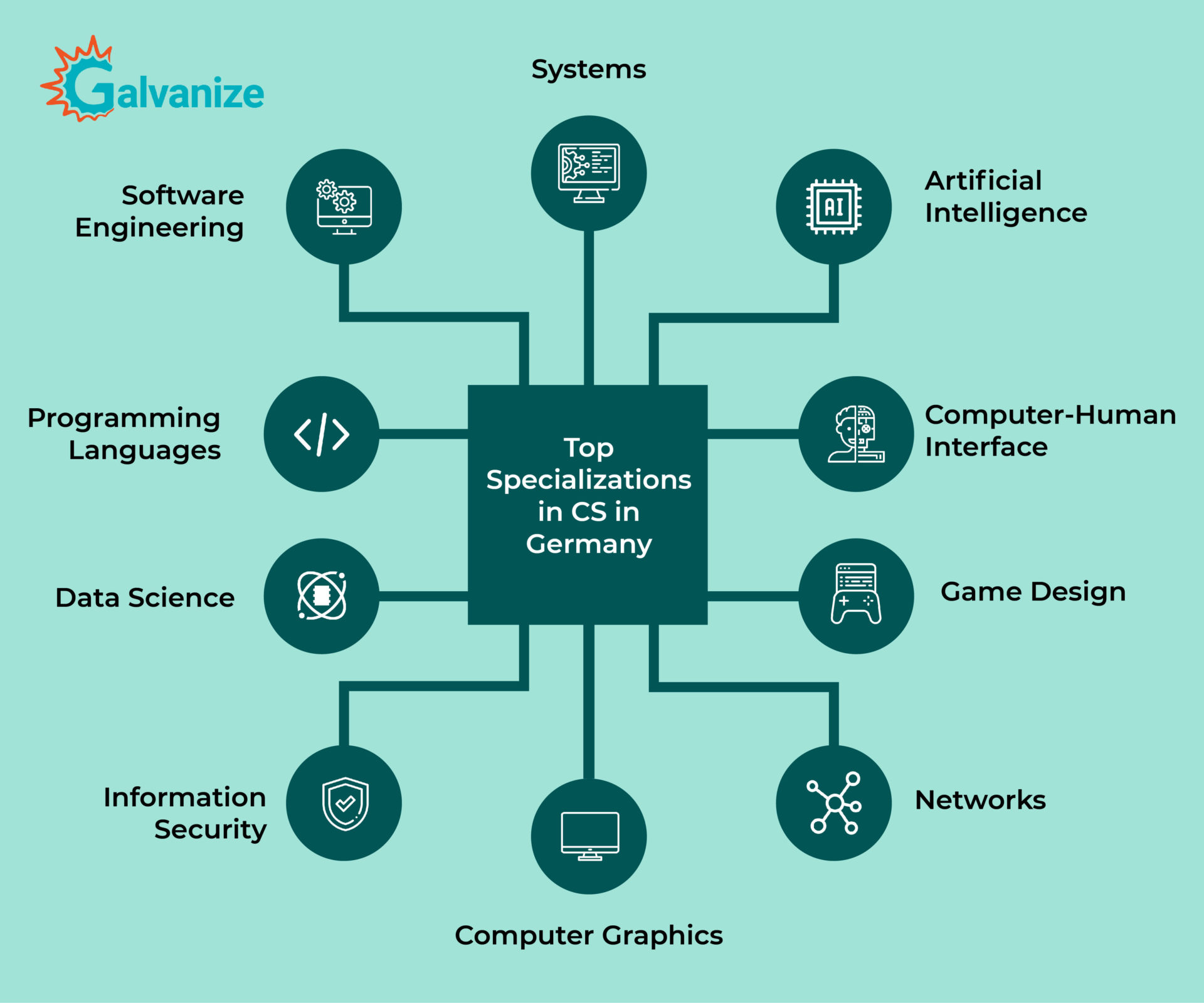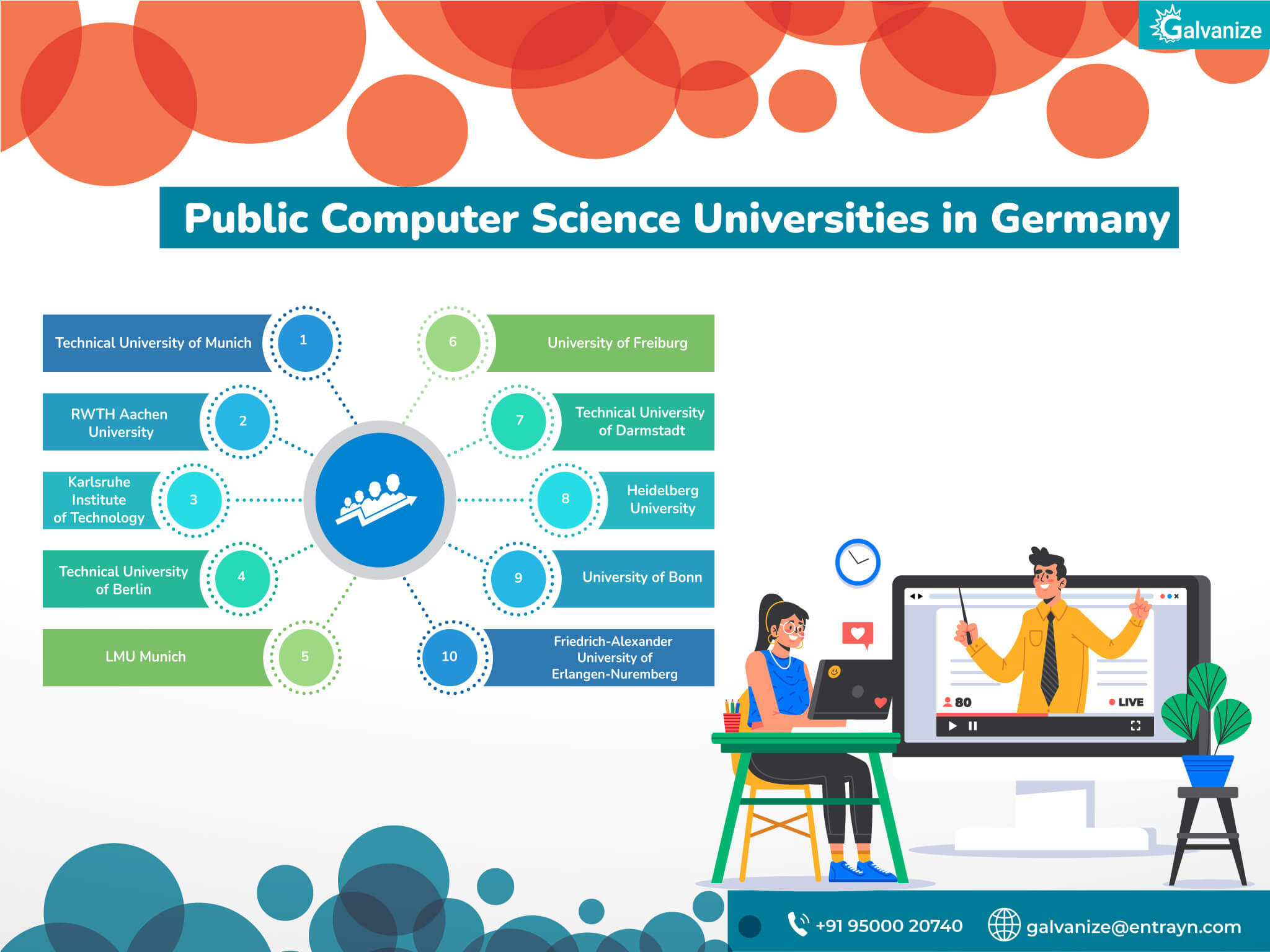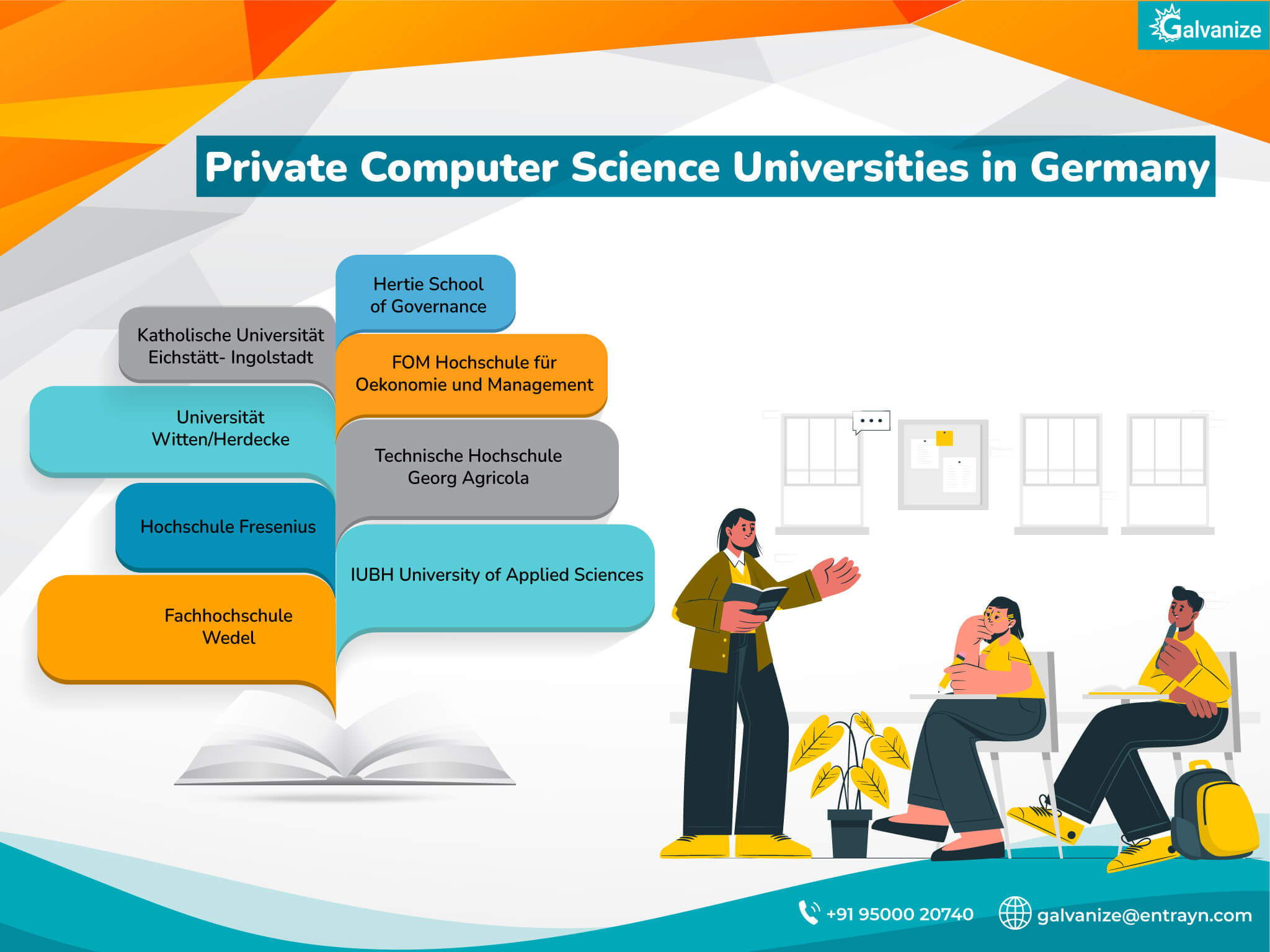
A Complete Guide To
Best Universities in Germany for Computer Science
Chapter 1
Overview
Germany is a well-known study destination for foreign students from all over the world. Some of Germany’s leading computer science universities are also listed among the world’s top universities. Computer science is one of the most popular subjects of study in Germany, not just among native students but also among foreign students. This area of study also has a high employment rate. In this article, you will find the best public and private university details for Computer Science in Germany.
Why Study Computer Science in Germany?
There are numerous locations that offer Master’s degrees in IT and Computer Sciences, but Germany is without a doubt one of the greatest places to sow the seeds of your computer career.
If you are unclear about whether you should study for a Master’s degree in CS in Germany, here are the major reasons to begin studying your study programs and preparing your application.
Hub of Technology and Innovation
When it relates to science and technology, few countries have had as much of an impact as Germany. Germany has risen up the technical ladder over the years, becoming one of the most significant countries in Europe and beyond in terms of development and innovation. German enterprises engage in research and development, which leads to outstanding results in the country’s economy, which is also one of the greatest in Europe and the globe. In fact, Germany was rated the world’s most technically sophisticated nation in the seventh edition of the Bloomberg Index Score in 2020.
Germany has completely embraced digitization, which has increased the demand for IT and Computer Science specialists of all specialisations.
Best Computer Science Programs
Germany has about 400 higher education institutions that are distinguished by their optimal blend of academic and practical expertise. In Germany, computer science programs are geared to fulfil the demands of the labour market. To deliver a good higher education environment, learning, administration, and research are inextricably linked. Aside from having excellent undergraduate and postgraduate CS programs, most public institutions in Germany provide tuition-free education. Students enrolled in public universities pay just an administrative fee.
World Valuable Qualifications
German certifications are well-known around the globe for their high quality and efficiency. International companies prioritise computer science credentials, especially given Germany’s reputation for technical development and creativity. As a CS graduate from a German university, you will most certainly have a plethora of opportunities in the worldwide employment market. Whether you want to work in your home nation, Germany, or somewhere in Europe or beyond, German credentials will provide you with the academic and practical skills you need to succeed.
Great Employment Opportunities
Germany is an excellent place to work as a computer engineer since its firms heavily spend on development and research, helping the country to keep its position as Europe’s biggest and the world’s 3rd largest economy. It boasts a number of start-ups and medium-sized tech enterprises, as well as huge international corporations with subsidiaries all over Europe and the world.
Deutsche Bank is an excellent example since, despite being a financial company, it employs a considerable number of computer engineers, programmers, and IT professionals. Siemens, Skytec, and even automobile manufacturers like BMW and Daimler are among the prominent German corporations that recruit IT graduates. Obtaining a certificate from one of Germany’s premier institutions is, without a doubt, a persuasive means of getting a decent career wherever in Europe and beyond.
Affordable Tuition Fees
Because of the government’s intention to assist facilitate access to education for all, most public institutions in Germany provide tuition-free study programs. While private colleges keep enrollment fees, they must compete with public schools and, as a result, do not impose prices that are out of reach for the majority of applicants.
Furthermore, living costs are low across Germany, lowering the overall cost of pursuing higher education in Germany as a foreign student.
Top Specializations in CS in Germany
1. Artificial Intelligence
The capacity of a computing system to solve problems, make predictions, or execute complicated tasks is referred to as artificial intelligence (AI). AI apps make use of cutting-edge technology like NLP, which understands written and spoken words, and ML, which allows applications to anticipate and propose actions.
2. Computer-Human Interface
This specialization considers the many ways that people interact with computers, from websites and mobile phones to voice-enabled speakers and virtual reality. To maintain the interoperability and usability of programs across systems, effective interface creation and deployment necessitates the usage of standard libraries.
Communication, interpersonal skills, attention to visual detail, mapping how people use software and systems
3. Game Design
Aside from the realistic graphics that make today’s videogames so enticing, the computer science specialty of game design examines the AI and machine learning that govern how players move through a game. The game design also takes into account how the efforts of front-end designers and back-end programmers should be integrated to create a unified product experience.
4. Networks
This specialty focuses on how corporations communicate information with various stakeholders using wired and wireless networks. Responsibilities include controlling bandwidth, transport, user access, information security, and also the security of any network-connected devices.
5. Computer Graphics
This specialization concentrates on 2D and 3D pictures utilized in a wide range of software applications, such as gaming, computer-aided design, manufacturing, and multimedia publication. Aside from the principles of producing realistic pictures, good computer graphic design takes into account the optimal approach to show such images given constraints like screen size, memory modules, and bandwidth. In-house, contract and freelance positions are all available.
6. Information Security
Information security experts are in charge of all elements of an organization’s security, such as application programs, networks, storage equipment, and devices. This CS specialization necessitates a thorough grasp of security flaws and the numerous ways used by internal and external hackers to exploit them. These jobs must also strike a balance between security and employee or end-user productivity.
7. Data Science
The capacity to “mine” massive data sets for useful information or insight is referred to as data science. When a variety of approaches are utilized to acquire and analyze data, particularly when it is used to handle enormous, complex, and often unstructured quantities of information, generally referred to as “big data,” organizations profit the most from data science as a profession.
8. Programming Languages
Programming language specialists comprehend the essential distinctions between popular languages like javascript, Visual Basic.NET, Python, Ruby, SQL, R, and C#. This involves understanding the sorts of applications, databases, and other use cases that each language is particularly fitted for.
9. Software Engineering
Aside from application development, the CS discipline of software engineering concentrates on the systems and protocols that these applications employ. Professionals in these professions may specialize in a variety of areas, including troubleshooting and debugging, performance and security, or an application’s capacity to add customers or features without negatively impacting performance.
10. Systems
This computer science specialty assists an organization in making the best use of the technology, software, and services that its employees utilize on a daily basis. These items can comprise both in-house developed systems and a wide range of third-party solutions. Key issues in this function include the performance, security, and efficiency of both the systems and the personnel that work with them.
Requirements to Study Computer Science in Germany :
The following are the academic and eligibility criteria for studying computer science in Germany:
Academic Requirements
- University Entrance Certificate (or equivalent).
- Proof of German proficiency, such as DSH or TestDaF, for German-taught programs.
- Proof of English proficiency, such as TOEFL or IELTS, for English-taught programs.
- Undergraduate degrees (for Master’s programs).
- Any other relevant academic transcript, certificates, or diplomas.
- Aptitude Assessment (when/if applicable) for Master’s programs.
- Additional standardized tests like GRE might be required.
Eligibility Requirements
- Students whose school leaving certificate is not recognized in Germany (non-EU/EEA students):
- One-year preparatory course (known as Studienkolleg in Germany).
- Students from outside of the EU/EEA:
- Preliminary documentation (vorprüfungsdokumentation) from Uni-Assist.
- Student visa upon university admission.
- Proof of financial resources (e.g., through a German blocked bank account).
- Proof of health insurance.
Application Process :
In Germany, seeking to study computer science is normally done directly to the institution, via their online application platforms, by making an account and filling out an application form. In general, candidates do not need to provide any paper documents; instead, they must upload them online. In general, the following documents are necessary for admission to a German university:
- Signed application form.
- University entrance qualification.
- Curriculum vitae and letter of motivation.
- Copy of valid passport or identity card.
- Other academic documents.
Degree Duration :
In Germany, a bachelor’s degree in CS requires 3 to 4 years of full-time study. Students are introduced to a wide range of disciplines connected to the functioning and management of computers, coding languages, computer systems, hardware, and software, and so on throughout this term of undergraduate education. After finishing their undergraduate studies in CS, many graduates choose to pursue a master’s degree in their subject of interest. A master’s degree in CS in Germany might require 1 and 2 years of full-time study, depending on the curriculum.
Top Computer Science Jobs in Germany :
- Technical project manager: €70000.00 per annum
- Data scientist: €48699 per annum.
- Data engineer: €71588 per annum.
- Software developer: €47068 per annum.
- Software architect: €77,557 per annum.
- Business intelligence analyst: €44,587 per annum.
- System engineer: €50378 per annum.
- Solution architect: €60,689 per annum.
- Information technology architect: €71,875 per annum.
- Development operation engineer: €59,622 per annum.
Chapter 2
Public Computer Science Universities in Germany :
Technical University of Munich :
The Technical University of Munich is one of Germany’s largest, with about 5,400 students. In terms of worldwide rankings, it has been the finest CS faculty in Germany for many decades. This department covers a wide range of topics, beginning with Software Engineering and progressing through Scientific Computing, Knowledge-Based Systems, and Robotics.
Highlights
| Year of establishment | 1868 |
| Also Known As | TUM |
| Total International Students | 13858 |
| Male/Female Ratio | 0.53 |
| UG/PG Course Ratio | 2.38 |
| No.of Campuses | 4 |
Ranking
|
Ranked By |
2018 |
2019 |
2020 |
2021 |
|
ARWU Universities Rankings |
48 |
57 |
54 |
NA |
|
QSWorld University Ranking |
64 |
61 |
55 |
50 |
|
Times Higher Education University Ranking |
41 |
44 |
43 |
41 |
|
US News & World Report |
80 |
77 |
77 |
76 |
RWTH Aachen University
This institution is situated in the German city of Aachen. It is well-known for its academic quality and high position among the world’s leading institutions. With 57 programs of study and 10,455 foreign students from 125 nations, this university leads in graduate counts and employability. This institution has 45,256 students enrolled in the 2018/2019 academic year. Through a vibrant and creative culture, RWTH Aachen University is dedicated to fostering a courteous and friendly environment.
Among the many courses available at this university, the Computer Science course stands out.
Highlights
| Year of establishment | 1870 |
| Also Known As | RWTH |
| Total International Students | 10455 |
| Size of Campus in acres | 620 |
| Male/Female Ratio | 0.47 |
| UG/PG Course Ratio | 1.72 |
| No.of Campuses | 1 |
Ranking
|
Ranked By |
2018 |
2019 |
2020 |
2021 |
|
ARWU Universities Rankings |
201-300 |
201-300 |
201-300 |
NA |
|
QSWorld University Ranking |
141 |
144 |
138 |
145 |
|
Times Higher Education University Ranking |
79 |
87 |
99 |
107 |
|
US News & World Report |
179 |
179 |
179 |
184 |
Karlsruhe Institute of Technology :
This Technology Institute places a premium on producing and disseminating knowledge for the benefit of society and the environment. Karlsruhe Institute of Technology excels in several fields, including physical sciences, architecture, economics, humanities, and social sciences. The domains of energy, mobility, and information are what distinguish this university.
The research-based study programs equip students to take on leadership roles in society, business, and science. Every student’s accomplishments are recognized on an individual basis, and everyone is given equal opportunity.
Highlights
| Year of establishment | 2009 |
| Also Known As | KIT |
| Total International Students | 4000 |
| UG/PG Course Ratio | 1.48 |
| No.of Campuses | 2 |
Ranking
|
Ranked By |
2018 |
2019 |
2020 |
2021 |
|
ARWU Universities Rankings |
201-300 |
201-300 |
201-300 |
NA |
|
QS World University Ranking |
107 |
116 |
124 |
131 |
|
Times Higher Education University Ranking |
133 |
135 |
175 |
201-250 |
|
US News & World Report |
183 |
181 |
181 |
197 |
Technical University of Berlin :
This university provides a diverse range of academic programs, including Computer Science. It has over 35,000 students, over 130 courses, and 40 institutions. The TUB is one of Germany’s major institutions. This institution has strategic collaborations with some of the world’s finest universities when it comes to globalization. About 23% of its students come from more than 130 different countries. Its outstanding achievements in research and teaching distinguish this institution not just in the field of CS, but also in any other subject of study.
Highlights
| Year of establishment | 1770 |
| Also Known As | TUB |
| Total International Students | 8443 |
| Size of Campus in acres | 149 |
| Male/Female Ratio | 0.49 |
| UG/PG Course Ratio | 1.5 |
| No.of Campuses | 3 |
Ranking
|
Ranked By |
2018 |
2019 |
2020 |
2021 |
|
ARWU Universities Rankings |
301-400 |
301-400 |
301-400 |
NA |
|
QS World University Ranking |
144 |
147 |
147 |
148 |
|
Times Higher Education University Ranking |
92 |
131 |
149 |
140 |
|
US News & World Report |
310 |
325 |
325 |
338 |
LMU Munich :
Ludwig-Maximilians-Universität München is regarded as one of Europe’s most prestigious academic and research institutions. It was created in 1472 and has since become a popular study location for many students, including internationals, all around the world. Famous scholars and outstanding students from all around the world have drawn inspiration from this university. This institution aims for excellence in all of its subjects of study in order to create a brighter future. A total of 15% of its 50,000 students come from countries other than Germany. It has a long history as one of Europe’s best institutions, and it collaborates with a large number of partner institutions outside of Europe.
Highlights
| Year of establishment | 1472 |
| Also Known As | LMU |
| Total International Students | 8515 |
| Male/Female Ratio | 1.49 |
| No.of Campuses | 1 |
| Yearly Hostel & Meals Expense | 3600 Euro |
Ranking
|
Ranked By |
2018 |
2019 |
2020 |
2021 |
|
ARWU Universities Rankings |
53 |
52 |
51 |
NA |
|
QS World University Ranking |
66 |
62 |
63 |
63 |
|
Times Higher Education University Ranking |
34 |
32 |
32 |
32 |
|
US News & World Report |
NA |
NA |
43 |
46 |
University of Freiburg :
The University of Freiburg, founded in 1457, offers undergraduate and graduate courses and certificates in today’s most significant fields, including the humanities, law, theology, natural and engineering sciences, and medicine. More than 24,000 students from all across the globe are engaged in the 180-degree programs offered by this university’s 11 faculties.
This university is well-known for its open-mindedness, international interchange, and academic brilliance. Curiosity plays a significant part in ensuring that this university and its students prosper in their studies and in the job market.
Highlights
| Year of establishment | 1457 |
| Total International Students | 4385 |
| Male/Female Ratio | 1.12 |
| No.of Campuses | 1 |
Ranking
|
Ranked By |
2018 |
2019 |
2020 |
2021 |
|
ARWU Universities Rankings |
101-150 |
101-150 |
101-150 |
NA |
|
QS World University Ranking |
171 |
186 |
169 |
175 |
|
Times Higher Education University Ranking |
82 |
76 |
86 |
83 |
|
US News & World Report |
163 |
NA |
158 |
168 |
Technical University of Darmstadt
Darmstadt’s Technical University was formed in 1877, thereby beginning its highly valued heritage of invention and accomplishment. It is well-known for its achievements in the fields of research, teaching, and transfer, as well as for offering possibilities that help to shape society for the better. Darmstadt Technical University is one of the best technical institutions in Germany, but it is not the only one. It is also highly recognized in terms of its worldwide standing. It focuses on engineering and biological sciences, and also humanities and social sciences.
Highlights
| Year of establishment | 1877 |
| Also Known As | TU Darmstadt |
| Size of Campus in acres | 618 |
| Male/Female Ratio | 0.42 |
| UG/PG Course Ratio | 1.26 |
| No.of Campuses | 2 |
Ranking
| Ranked By | 2018 | 2019 | 2020 | 2021 |
| ARWU Universities Rankings | 401-500 | 501-600 | NA | NA |
| QS World University Ranking | 272 | 253 | 260 | 267 |
| Times Higher Education University Ranking | 201-250 | 251-300 | 251-300 | 301-350 |
| US News & World Report | NA | NA | 497 | 543 |
Heidelberg University :
Heidelberg University describes itself as a teaching and research university with an international focus. It covers a wide range of courses and fields of study, with a focus on knowledge and abilities, as well as an open mind. This university’s Faculty of Mathematics and Computer Science is not the only one with a stellar reputation. It is also well-known for its other faculties, which include biosciences, physics and astronomy, arts, and theology, among others.
Heidelberg University provides some of the greatest circumstances for a relaxing teaching and studying atmosphere. The comfort of its students, as well as its academic achievement and knowledge, are what distinguishes this institution as one of the best in Germany.
Highlights
| Year of establishment | 1386 |
| Total International Students | 5563 |
| Male/Female Ratio | 1.17 |
| No.of Campuses | 4 |
Ranking
| Ranked By | 2018 | 2019 | 2020 | 2021 |
| ARWU Universities Rankings | 47 | 47 | 57 | NA |
| QS World University Ranking | 68 | 64 | 66 | NA |
| Times Higher Education University Ranking | 45 | 47 | 44 | 42 |
| US News & World Report | 54 | 56 | NA | 54 |
University of Bonn :
The University of Bonn, established 200 years ago, is currently known as a contemporary research university with a wide range of topics, as well as world-renowned science at the highest level. This institution has 35,000 students, 5,000 of them are foreign students from all across the world. It offers over 200 different disciplines and degrees, and also 6,000 doctorate students. It is also worth noting that this institution has established transdisciplinary research areas in which specialists from other disciplines collaborate to seek answers to scientific and societal concerns.
Highlights
| Year of establishment | 1818 |
| Total International Students | 5000 |
| No.of Campuses | 5 |
Ranking
| Ranked By | 2018 | 2019 | 2020 | 2021 |
| ARWU Universities Rankings | 101-150 | 70 | 87 | NA |
| QS World University Ranking | 239 | 255 | 243 | 240 |
| Times Higher Education University Ranking | 100 | 110 | 105 | 114 |
| US News & World Report | 109 | 108 | 108 | 114 |
Friedrich-Alexander University of Erlangen-Nuremberg :
This university’s mission is to utilize knowledge to enhance the future and improve the world for future generations. It was founded in 1743 and presently has over 40,000 students who study at its campuses in Erlangen, Nuremberg, and Fürth.
When the Faculty of Engineering was established in 1966, it was the first German university to merge a traditional university with a technological institution. The Faculty of Engineering is currently well-known on a global scale for its excellence. This faculty is made up of five departments, one of which is the Department of Computer Science, which focuses on both basic and technologically relevant problems.
Highlights
| Year of establishment | 1743 |
| Also Known As | FAU |
| Male/Female Ratio | 1.01 |
Ranking
| Ranked By | 2018 | 2019 | 2020 | 2021 |
| ARWU Universities Rankings | 201-300 | 201-300 | 201-300 | NA |
| QS World University Ranking | 287 | 299 | 319 | 317 |
| Times Higher Education University Ranking | NA | NA | NA | 198 |
| US News & World Report | 228 | NA | 240 | 238 |
Chapter 3
Private Computer Science Universities in Germany :
Katholische Universität Eichstätt- Ingolstadt :
Katholische Universität Eichstätt- Ingolstadt is the sole Catholic university in the German-speaking area and one of more than 200 Catholic universities in the world. It is one of Germany’s largest non-state institutions, with 4,808 students, comprising 803 from colleges of applied sciences.
Ranking
| Country rank | 93 |
| World rank | 1755 |
Universität Witten/Herdecke :
Universität Witten/Herdecke is a popular choice for students interested in healthcare and medicine since it was one of the first private institutions established in Germany in the state of NRW. It is conveniently placed among healthcare organizations and provides students with hands-on training and a study curriculum. This university is especially well-known for its nursing programs, which attract both domestic and foreign students.
Ranking
| World Rank | 1444 |
| National Rank | 63 |
Hochschule Fresenius :
Hochschule Fresenius has facilities throughout Germany and offers a variety of full- and part-time degree programs (Bachelor’s and Master’s), apprenticeships, and continuing education. It is split into five sections: Health & Social, Business & Media, Chemistry & Biology, Design, and Onlineplus.
Ranking
| World Rank | 2919 |
| National Rank | 143 |
Fachhochschule Wedel :
Fachhochschule Wedel is one of Germany’s few private but non-profit universities. It is a state-recognized university that provides eleven Bachelor’s and six Master’s degree programs in CS, technology, and business.
Ranking
| World Rank | 8185 |
| National Rank | 174 |
Hertie School of Governance :
Hertie School of Governance is a state-recognized private institution in Berlin that has the authority to confer doctorates. The non-profit Hertie Foundation established it as a non-profit GmbH in December 2003. The university aspires to be a world-class institution of higher learning for the international, multidisciplinary, and intersectoral study of administration and policy, with a concentration on the transfer of conceptual knowledge, analytical methodologies, and practical skills.
Ranking
| World Rank | 2306 |
| National Rank | 117 |
FOM Hochschule für Oekonomie und Management :
FOM Hochschule für Oekonomie und Management is a private, state-recognized university in Essen, Germany, that primarily provides degree programs in engineering, business, and health science to working professionals and apprentices. FOM is Germany’s largest face-to-face institution, with over 57,000 students, and offers a variety of time models to ensure the flexibility of studying and working. About 40 Bachelor’s and Master’s degree programs are available in six university regions.
Ranking
| World Rank | 2443 |
| National Rank | 123 |
Technische Hochschule Georg Agricola :
Technische Hochschule Georg Agricola is a private, state-recognized university of applied sciences located in Bochum. This program, also known as THGA, is ideal for students who seek a hands-on education, particularly if process and materials, mechanics, and mining sciences are of interest. The institution is almost two centuries old and is located near the mining town of Bochum, and that is why students learn via practice.
Ranking
| World Rank | 4202 |
| National Rank | 220 |
IUBH University of Applied Sciences :
IUBH University of Applied Sciences, established in 1998, is a private, state-recognized university of applied sciences in Erfurt. In the academic year 2019/2020, the university registered 30,576 students, the majority of them were registered in distance learning programs, making it the biggest private distance learning institution in Germany. IUBH provides academic programs in various subject areas, including a substantial program in information sciences.
Ranking
| World Rank | NA |
| National Rank | NA |
FAQs :
Is Computer Science free in Germany?
You can get many free public universities for CS in germany.
Is the GRE score accepted in Germany?
GRE is not mandatory, but many universities accept GRE scores to assess the applicants’ levels.
Does CGPA matter for MS in Germany?
You need a CGPA of 7 or 70% to pursue MS in Germany
Conclusion :
There are numerous locations that offer Master’s degrees in IT and Computer Sciences, but Germany is without a doubt one of the greatest places to sow the seeds of your computer future. With high-quality education, cultural variety, and mainly free education, it’s no surprise that so many international students desire to study in Germany. With its picturesque streets, low-cost recreational activities, museums, and galleries, this country is noted for its vibrant environment and comfortable living.














